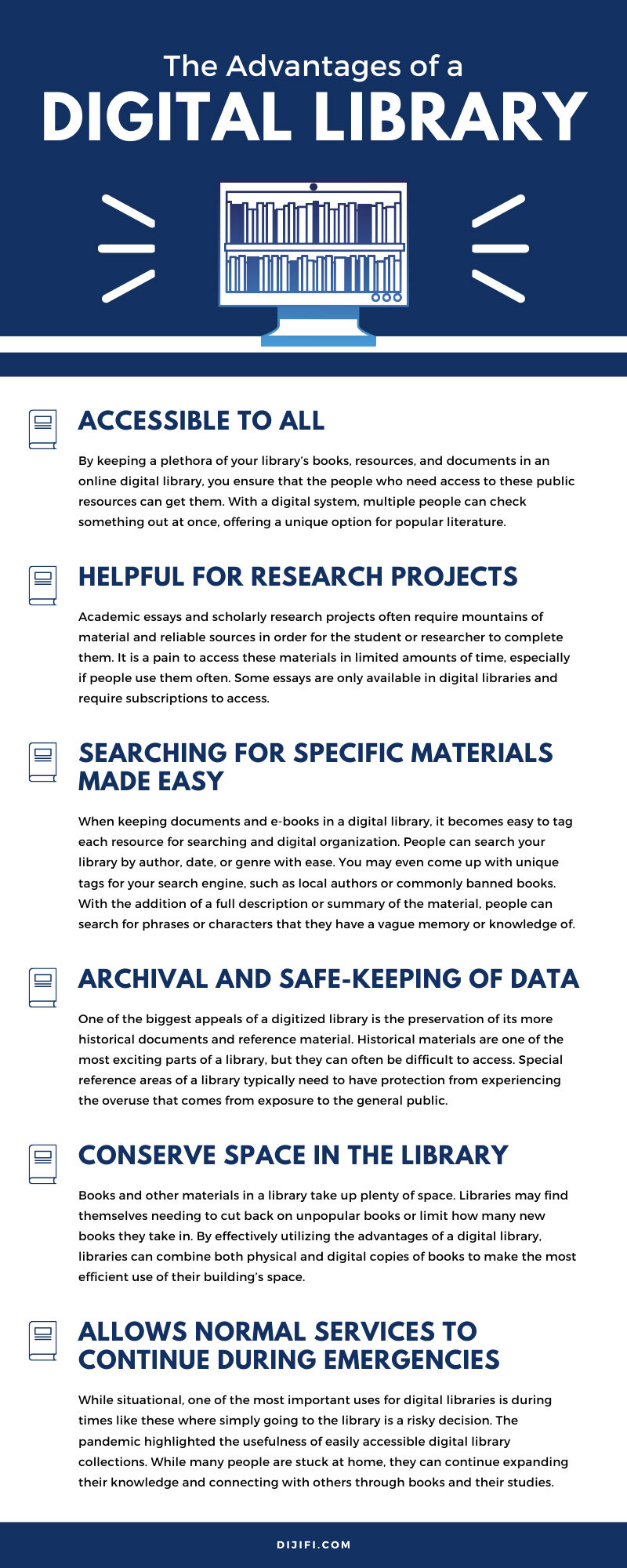The Advantages of a Digital Library
Digital accessibility is important for every educational industry, but especially for the public library. Online databases have become the norm for scholars, doctors, and educators alike—but their use stretches into the realm of public service as well. Since many public spaces, including libraries, still need to keep their doors closed to the people, finding ways to make media and information easily accessible to the masses is more important than ever. Whether you and your organization are considering opening your own digital library to your patrons or opening a subscription to one, knowing the advantages of a digital library may help you finally make a decision.
Accessible To All
Not everyone is able to make regular trips to the library, but internet access is slowly but surely making its way into every household—or wherever people can easily find access to free Wi-Fi. By keeping a plethora of your library’s books, resources, and documents in an online digital library, you ensure that the people who need access to these public resources can get them. With a digital system, multiple people can check something out at once, offering a unique option for popular literature.
Your library may have unique resources that are only accessible from your organization and nowhere else, such as local schools’ yearbooks and historical newspapers. People may not often consider the reality of accessing these documents—but in a digital library, they can look for as long as they like. Whether they are members of the community who have moved away or residents who can’t make the trip to the physical building anymore, anyone can access anything your library makes public.
By requiring users to make an account or locking the feature behind a password, you can make sure that only library patrons from your network can access it.
Helpful for Research Projects
Academic essays and scholarly research projects often require mountains of material and reliable sources in order for the student or researcher to complete them. It is a pain to access these materials in limited amounts of time, especially if people use them often. Some essays are only available in digital libraries and require subscriptions to access. For historical research, however, your digital resources may prove to be extremely important for the researcher, and having easy access can not only make it easy to reference, but also easy to source, too.
Searching for Specific Materials Made Easy
When keeping documents and e-books in a digital library, it becomes easy to tag each resource for searching and digital organization. People can search your library by author, date, or genre with ease. You may even come up with unique tags for your search engine, such as local authors or commonly banned books. With the addition of a full description or summary of the material, people can search for phrases or characters that they have a vague memory or knowledge of.
This search process exists now in many library systems as a means of checking books out or putting them on reserve. A library with solely digital materials allows for refinement of the search and modernizing the process. Because the media is completely digital, patrons of the library can have access to the materials immediately without needing to make a trip to the building itself.
Archival and Safe-Keeping of Data
One of the biggest appeals of a digitized library is the preservation of its more historical documents and reference material. Historical materials are one of the most exciting parts of a library, but they can often be difficult to access. Special reference areas of a library typically need to have protection from experiencing the overuse that comes from exposure to the general public. However, once the library has digitized all of its materials and archived them online, anyone can access them at any time.
Documents that would normally require care and special treatment can stay out of excessive public use, allowing libraries to preserve them for a longer period of time. While the digitization of an entire library’s worth of special collections may seem like a hefty project to undertake, they may seek out the assistance of a professional scanning company’s digital conversion services for high-quality, careful scans that librarians can easily transfer to their digital library. At DiJiFi, we understand the fragility of your antique reference materials, and provide them with the utmost respect and security.
Some materials kept in special collections may consist of obsolete technology such as projector slides, film, and fiche. Professional digital conversion companies specialize in modernizing old media formats for use by current audiences. By bringing the old formats into the modern world, more people can experience them, and the library can make room in the building by removing or replacing the obsolete technology.
Conserve Space in the Library
Books and other materials in a library take up plenty of space. Libraries may find themselves needing to cut back on unpopular books or limit how many new books they take in. By effectively utilizing the advantages of a digital library, libraries can combine both physical and digital copies of books to make the most efficient use of their building’s space.
They may keep physical copies of older or more popular books and keep digital copies of less popular books. Alternatively, a library can keep physical copies of books for their older audiences who may not make the most use of the digital library and put their books for younger audiences online—how they decide to organize their storage may vary based on the amount of space a library has.
In the library’s special collections section, space is a precious commodity. Once less important documents have been secured in the digital library, the librarians may store them elsewhere or even dispose of them as long as they are not important—such as things like modern mass-produced newspapers or magazines.
Allows Normal Services To Continue During Emergencies
While situational, one of the most important uses for digital libraries is during times like these where simply going to the library is a risky decision. The pandemic highlighted the usefulness of easily accessible digital library collections. While many people are stuck at home, they can continue expanding their knowledge and connecting with others through books and their studies. Though the regular patrons of the library may not be able to check books out in person, they can peruse the entire digital library for new material to read—even if the library is closed.
Bring your library and community into the 21st century by working with DiJiFi to create a digital library of the building’s archives. We can handle your scanning and conversion projects, whether small or large. Rely on us to preserve the precious memories of your library’s community and the history of your village, town, or city.


